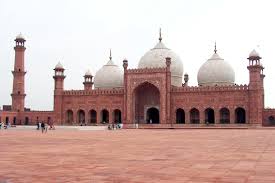mosque
英 [mɒsk]
美 [mɑsk]
TEM4 GRE CET6
mosque 清真寺来自阿拉伯语masjid,祷告的地方,清真寺,来自ma-,表方位,sajada,俯伏在地,祈祷,祷告。
- mosque
- mosque: [17] Mosque means etymologically a place where you ‘bow down’ in prayer and is, not surprisingly, of Arabic origin. It comes from Arabic masjid ‘place of worship’, a derivative of the verb sajada ‘bow down’. English acquired the word via Italian moschea and French mosquée as mosquee, but soon dropped the final -e. (The Arabic form masjid or musjid has been intermittently used in English in the 19th and 20th centuries.)
- mosque (n.)
- 1717, earlier moseak (c. 1400), also mosquee (16c.), probably in part from Middle French mosquée, from Italian moschea, earlier moscheta, from Spanish mesquita (modern mezquita), from Arabic masjid "temple, place of worship," from sajada "he worshipped" + prefix ma- denoting "place." Mangled in Middle English as muskey, moseache, etc.
- 1. The destruction of the mosque has provoked anger throughout the Muslim world.
- 毁坏清真寺的行为激怒了整个伊斯兰世界。
来自柯林斯例句
- 2. Hundreds of thousands of people packed into the mosque.
- 几十万人挤进了那座清真寺。
来自柯林斯例句
- 3. A glittering Islamic crescent tops the mosque.
- 新月形标志在清真寺顶端闪闪发光。
来自柯林斯例句
- 4. Here is the remains of a mosque.
- 这里是一所清真寺的废墟.
来自《简明英汉词典》
- 5. They go to the mosque to pray once a week.
- 他们每周一次到清真寺去祈祷.
来自辞典例句
[ mosque 造句 ]
